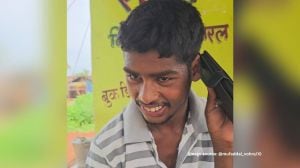Protesters halt goods train, effects seen in areas dominated by tribals in state
The train moved after a forced halt of around an hour-and-a-half and went towards Bhavnagar, officials said.
 Members of the SC and ST communities take part in a protest in Surat on Wednesday. (Hanif Malek)
Members of the SC and ST communities take part in a protest in Surat on Wednesday. (Hanif Malek)Blocking the railway tracks, protesters on Wednesday forced a goods train to halt in Wadhwan town of Surendranagar district during the day-long Bharat Bandh call given by a few Dalit and Adivasi groups against the recent Supreme Court judgment allowing sub-classification of Scheduled Castes and Scheduled Tribes for reservation.
The protests evoked mixed reactions across Gujarat with effects of bandh clearly visible in some parts, especially the areas dominated by the tribal communities including districts like Chhota Udepur, Narmada, Surendranagar, Sabarkantha, and Aravalli where markets in cities and semi-urban areas remained closed. Protest rallies and sit-ins were organised in Vadodara and Ahmedabad also.
Soon after the protesters blocked the goods train in Wadhwan taluka, a team from Surendranagar police station reached the site to disperse the crowd. “A group of women occupied railway tracks around 10.30 am at a level crossing in the Ganpati Fatsar area. Due to the protest, a goods train travelling from Surendranagar to Botad had to be halted near a station in Wadhwan,” DSP Vishwarajsinh Jadeja said.
The Western Railway confirmed the incident. “We have seen photos of people occupying the track and therefore a goods train had to be halted,” said Mashooque Ahmad, Senior Divisional Commercial Manager, Bhavnagar.
Public Relations Inspector for the Bhavnagar division Shambhu Singh said the Government Railway Police and the Railway Protection Force later cleared the tracks. “We persuaded protesters to clear the railway track and they agreed to withdraw from the tracks to allow the resumption of traffic,” Jadeja said.
The train moved after a forced halt of around an hour-and-a-half and went towards Bhavnagar, officials said.
In Surat, members of the SC/ST community held a rally and submitted a memorandum to District Collector Sourabh Pardhi in support of the nationwide protest called by the Reservation Bachao Sangharsh Samiti.
Under the banner of the Dr Baba Saheb Ambedkar Samajik Dayitya Samithi, a crowd gathered at Mandarwaja on Ring Road, where protesters garlanded a statue of Dr Ambedkar and chanted slogans against the Supreme Court’s sub-classification ruling. Police were deployed along the rally route.
“The Supreme Court ruling is part of a conspiracy to weaken the SC/ST community and is
unconstitutional,” one of the protesters said. Umarpada town in the Surat district wore a deserted look in the early afternoon as shops remained closed. In places like Kosamba in the district, protesters requested traders to shut shops.
In Aravalli district, protesters blocked roads in Bhiloda and Shamlaji areas even as several main markets downed shutters with groups taking to the streets to hold demonstrations amid tight police presence.
Several protesters were detained in Patan district while trying to enforce the bandh, officials said.The impact of the bandh call was seen in the towns of Idar and Vijaynagar in the Sabarkantha district where markets, schools and colleges remained closed, with the authorities ordering heavy police deployment to maintain law and order.
Shouting slogans, SC/ST organisations took out protest rallies in Vadodara. In the Amraiwadi locality of Ahmedabad city, members of the Dalit community observed a sit-in and blocked a road.
Twenty-one organisations across the country have called for a Bharat Bandh on Wednesday against the recent ruling by the Supreme Court on quota. The organisations have said that it will harm the basic principles of reservation.
On August 1, the top court had observed that states are constitutionally empowered to make sub-classifications within the SCs (Scheduled Castes), which it said form a “socially heterogeneous class”, for granting reservation for the uplift of castes that are socially and educationally more backward among them.
The apex court, however, made it clear that states have to make the sub-classification based on “quantifiable and demonstrable data” of backwardness and representation in government jobs and not on “whims” and as a matter of “political expediency”.
WITH PTI INPUTS












